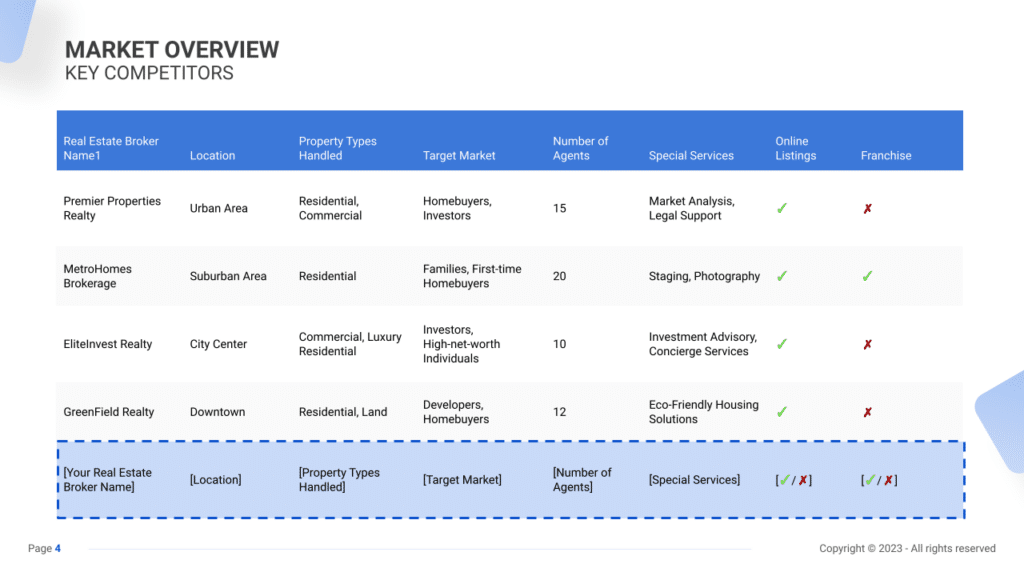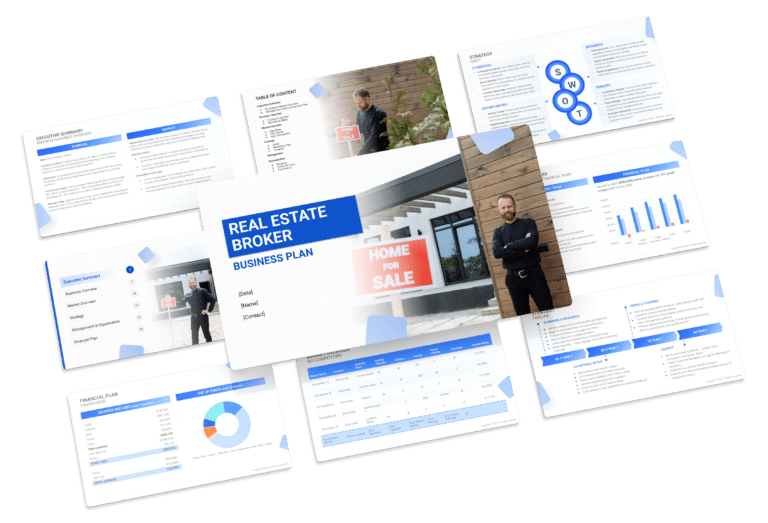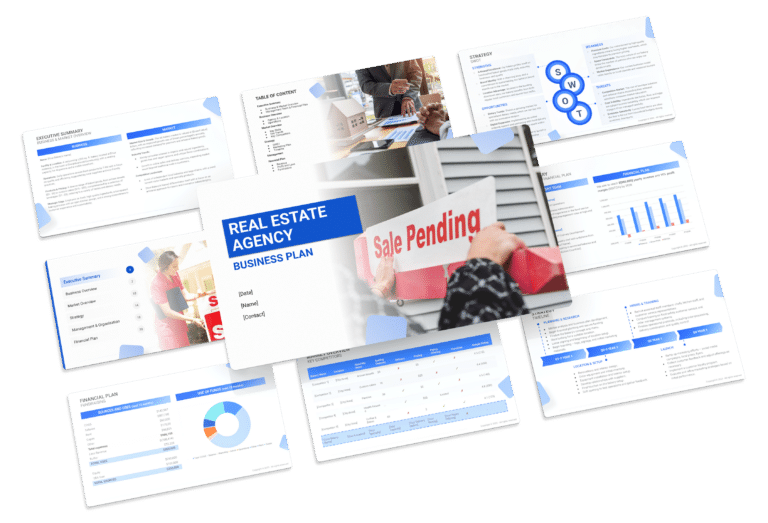Competitive Analysis for a Real Estate Broker Business (Example)

A competitive analysis is not just a tool for gauging the position of your real estate broker business in the market and its key competitors; it’s also a fundamental component of your business plan.
This analysis helps in identifying your real estate broker business’s unique selling points, essential for differentiating your business in a competitive market.
In addition, the competitive analysis is integral in laying a solid foundation for your business plan. By examining various operational aspects of your competitors, you gain valuable information that ensures your business plan is robust, informed, and tailored to succeed in the current market environment.

Identifying Your Competitors in the Real Estate Broker Industry
The first step in conducting a competitive analysis is to identify your competitors. Start by listing local real estate agencies and independent brokers. If your business specializes in luxury properties or commercial real estate, your direct competitors include nearby firms that focus on similar segments, as well as larger, national firms that offer a wide range of real estate services. Also, consider indirect competitors like online real estate listing platforms that facilitate direct buyer-seller transactions.
Utilize tools like Google Maps to get a geographical overview of where these competitors are located. Platforms like Yelp and other customer review sites can provide insights into the strengths and weaknesses of these competitors through user feedback. For instance, if a competitor consistently receives praise for its customer service and market knowledge, these are significant strengths.
Real Estate Broker Competitors’ Strategies
Analyzing the strategies of these competitors involves several key aspects:
- Property Listings: Evaluate the quality and diversity of property listings. If “Premier Properties” is known for its extensive list of high-end homes, this indicates a strong foothold in the luxury market.
- Marketing and Advertising: Assess how competitors market their properties. Do they use sophisticated digital marketing strategies, hold open houses, or rely on print and local television advertising?
- Client Services: Examine the range of services offered. A company like “Total Realty Solutions” that provides staging, photography, and virtual tours might appeal more to sellers who are looking for comprehensive service packages.
- Pricing and Commission Structure: Compare your pricing and commission rates with those of competitors. Are your fees competitive with cost-effective options like “EconoBroker,” or are they aligned with premium services offered by “Elite Realty”?
- Market Specialization: Look at the market segments they specialize in. For instance, “Urban Commercial Brokers” might dominate the commercial real estate market in your area, indicating a potential gap or opportunity in residential real estate.
- Customer Relationship Management: Consider the effectiveness of their customer relationship strategies. For example, “Client-Centric Realty” might be known for its personalized approach and long-term client relationships, enhancing its reputation and repeat business.
What’s Your Real Estate Broker Business’s Value Proposition?
Think about what sets your brokerage apart. Maybe you offer an unmatched expertise in waterfront properties, or perhaps your business excels in leveraging cutting-edge real estate technology for market analysis and client communications.
Identify market opportunities through client feedback and industry trends, such as a rising demand for sustainable and green properties, which could be a niche market if not extensively covered by competitors.
Consider your target market: A real estate broker in a bustling city center might focus on high-density residential and commercial properties, whereas one in suburban areas could specialize in family homes and new developments.
How To Summarize It All In Your Business Plan?
Competitors’ strategies and market positioning can be superposed with your own real estate broker business’s value proposition by laying out on a page (or a presentation slide) the main differentiating factors. These factors will show investors and banks:
- How each competitor is positioned in the market
- How your real estate broker business compares vs. competitors (what’s your value proposition)
In a competitive analysis, various parameters are used to compare and contrast your real estate broker business with its competitors. The parameters listed below are examples of what you might include in your analysis.
They are not exhaustive but serve as a guide to help you understand key aspects to consider. Each parameter provides insights into different facets of the competitive landscape, helping to paint a comprehensive picture of where your real estate broker business stands.

Location
The location of your real estate brokerage significantly impacts the properties you have access to and the clientele you attract. A brokerage in a bustling urban area may focus on condos and commercial properties, while one in a suburban area might specialize in residential homes or luxury estates.
Property Types Handled
Specifying the types of properties your brokerage handles, such as residential homes, commercial real estate, luxury properties, or rental units, helps define your market niche. This distinction can attract clients looking for specialized services tailored to specific property types.
Target Market
Identifying your target market, whether first-time homebuyers, property investors, or high-net-worth individuals, shapes your marketing strategies and service offerings. Tailoring your approach to meet the unique needs of your target demographic can set your brokerage apart in a competitive market.
Number of Agents
The number of agents working at your brokerage can indicate the scale of your operations and your ability to handle multiple listings and clients simultaneously. A larger team might provide comprehensive coverage and expertise, whereas a smaller team could offer more personalized, boutique-style services.
Special Services
Offering special services such as virtual tours, staging, or legal advice can enhance your brokerage’s appeal. These value-added services not only help distinguish your business from competitors but also provide additional convenience and support to your clients.
Online Listings
An effective online listing system that showcases available properties with high-quality photos, detailed descriptions, and virtual tours can significantly enhance your market presence. This tool not only attracts tech-savvy clients but also provides a platform for broader property exposure.
Franchise
Being part of a franchise can leverage national brand recognition and a vast network, providing a solid foundation for new brokers. Conversely, operating as an independent brokerage allows for greater operational flexibility and the ability to cultivate a unique brand identity.
Other Comparison Factors
Additional factors to include in your competitive analysis are:
- Marketing Strategies: Understanding how competitors market their properties can provide insights into effective advertising channels and promotional tactics.
- Client Relationships: The level of customer service and the strength of client relationships can be a key differentiator. Assessing how competitors manage client satisfaction can help in refining your customer engagement strategies.
- Brand Presence: Evaluating the online and offline presence of competitors, including social media activity and community involvement, can inform your own branding strategies.
- Technological Adoption: Utilization of the latest real estate technologies, such as CRM systems or data analytics tools, can enhance operational efficiency and client service.
- Industry Partnerships: Partnerships with local businesses, financial institutions, or home repair services can offer comprehensive solutions to clients, enhancing the customer experience.





